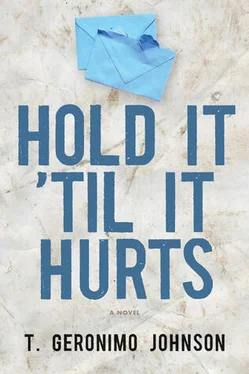Achilles hadn’t thought about it. Did it matter what he said? A few people were already milling around on the church lawn. Troy would arrive soon. “Sure.”
“How much?”
Achilles didn’t have much money on him, maybe two hundred dollars. He took in Bud’s torn and faded T-shirt, the dingy towel bunched around his neck like an ascot, the shoestring holding the African medallion around his neck. He recalled the barefoot kids in the cut-off jeans and the families he’d seen. “A hundred?”
Bud smiled. “What’s his name?”
“Troy.”
“Nice pen,” said Bud.
“Pencil. It’s a mechanical pencil.” His father had given it to him as a high school graduation gift. “It was my father’s.”
“A mechanical pencil. How about that. A pencil that is mechanical.” Bud rubbed his long jaw. “How old are you, son?”
“Twenty-two.”
Nodding as if it all made sense now, his gaze focused on the pencil, Bud asked, “Can I keep that flyer with the picture?”
“Sure.” Achilles slid him the program.
Bud pointed to the number on the bottom. “This number good?”
Achilles tapped his cell phone, “I’m always here.”
“I’m Bud. I’ll get back with you.”
He gave Achilles one last look and limped off. He didn’t bend his left leg at all, and he bobbed to the side with each step as if the right leg was significantly longer. Merriweather had had a similar walk in the hospital. Even though his prosthetic was customized so that his legs were even, he stepped gingerly on his left leg, as if he didn’t trust it to hold his weight, as if steel weren’t so much terribly stronger than bone. Bud was about the right age for a Vietnam or Korea vet. Watching him hobble off, Achilles decided that maybe he wasn’t so bad after all.
Wages had promised to stop by St. Augustine to keep Achilles company during the wait. The bus he took home every day passed right by the church, which was how he’d seen Troy in the first place. When Wages got off the bus that evening, everyone looked at the white guy in the black suit like he was lost. A couple of young guys Achilles hadn’t noticed before immediately materialized, emerging from the cubbies between cars and trees, and spoke to Wages using a series of brief head gestures and hand signs that flashed too fast for Achilles to understand. Wages answered in kind. One kid in an oversized white T-shirt and denim shorts that came down to his ankles was particularly insistent. He gestured violently toward Wages, waving his hand like he’d burned his fingers, stepping closer with each wave of the hand, backing off only when it became clear Wages wouldn’t. Achilles realized he was gripping the table and went outside to meet Wages.
“What was that about?” Achilles asked.
“You know. Ain’t no window-shopping here.” Wages laughed. “Dude just wants to know what I’m doing in the store if I ain’t buying. The usual, you know.”
“Yeah,” said Achilles. With the fancy suit and nice shoes, Achilles would have assumed Wages was there to help the church. The only thing missing from that nice, clean jacket was a crucifix pinned to the lapel. He would never have thought Wages was interested in anything they sold here. Just look at them and look at him.
Of the hundred or so people who were now lined up around the block an hour before the kitchen even opened, only a dozen or so were white. White or black, they all wore scruffy, ill-fitting clothes, but the groups were distinctly different. One white man wore a funny suit that upon closer inspection proved to be a jumpsuit cut into two separate pieces, the top cropped so short he resembled a crazed mariachi player. That was the difference: the blacks looked poor, but the whites looked poor and crazy. Some of the icy aggravation Achilles felt about his brother’s selfish decision melted into a sympathy that tingled, the way his fingers did while thawing out from a deep cold. His throat constricted at the thought of Troy in this line learning that one of these men was his real father. He tried to imagine a resemblance between Troy and some of the men but couldn’t see it. For the first time it occurred to him that his brother might need him.
Achilles and Wages walked up and down the line to kill time. Some men wore authentic GI, but most pieces looked to have come from flea markets or army surplus stores, as they were too old or too new for the people wearing them. Wages counted the number of men dressed in fake camouflage, pointing out camo T-shirts, camo head wraps, camo sneakers, and even camo baseball caps. Though he understood and appreciated Wages’s attempts to distract him, it wasn’t too long before Achilles lost count as he silently, involuntarily, compared every face to Troy’s.
Two older men wearing ragged army coats that could have been their own straightened when Wages and Achilles approached, their tones hushed and heads straight ahead, as if for inspection. He couldn’t understand how so many of them wore jackets and coats in the heat. As they passed an old man in a jungle jacket, Achilles wondered, Where are his friends? How did someone become so separated from his tribe? If he had any friends, surely he wouldn’t be in those worn boots and frayed jacket, in that line, in this neighborhood. The older men in the ragged army coats laughed, a few others chimed in. They had nothing to worry about, just show up and eat.
The block transformed during the twilight hours. The guard changed at the corners as the old surrendered their spots to the young, who were armed with more than beer cans and branches. Mothers called their children, who ducked conspicuously behind their friends. Volleys of catcalls were met with coos and curled fingers. Sullen figures darted into alleys, sauntering out minutes later with blazing smiles. Foreign cars big as boats docked long enough to exchange currency with skulking teens swimming in oversized black hoodies. Wages mumbled, “Who says you can’t buy happiness?”
The sun had set by the time the last person was fed. The copper dome on the church’s bell tower, verdigris by day, had turned crimson, then magenta, and finally black. The neon sign at the café across the street popped on. SEATON’S flashed a red-letter warning. One of the few working streetlights buzzed overhead, spotlighting Achilles, who didn’t know what to do next. He’d stared at people as if looking at them hard enough could transform them into someone they weren’t. He had hoped, even believed, that Troy would show up. He had believed. He had. It was only a week since Wages had seen Troy, so it was natural for him to be hopeful, right? It was only fair; it wasn’t weak or naïve, Was it? A silhouette turned the corner at the far end of the block, running toward them at a rapid pace. Achilles recalled the buoyant mood that had possessed him earlier on his own jog to the church, and felt foolish to have let hope get the best of him. As he watched the jogger approach, his loping stride not unlike Troy’s, Achilles refused to believe it might be his brother, and turned away. He heard the footsteps slow to a walk as the man neared, holding his breath as he monitored Wages’s eyes for a spark of recognition.
Wages looked down and said, “There’s a fight on tonight.”
Achilles sucked air.
The latecomer yanked at the church door. “Hope it’s not too late.”
Wages snapped his fingers in the air in front of Achilles. “Quarter? Better yet, I have all the southern comforts at home. I have Jim.”
Drinking the night down would only depress him. Achilles wanted to be alone, to be anywhere except on that couch with a hundred pictures of Wages and Bethany smiling down on him, witnessing his private grief. Prayer hadn’t helped. What was he doing wrong?
Читать дальше












